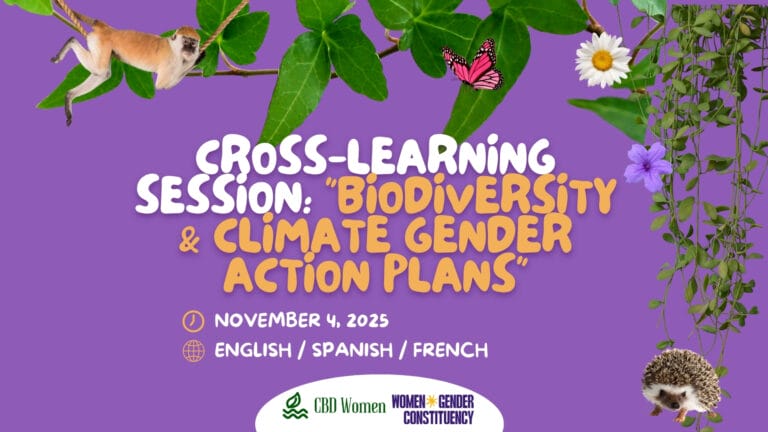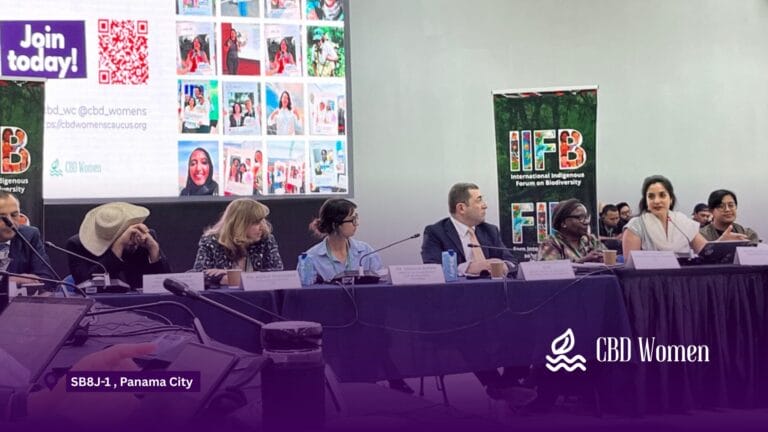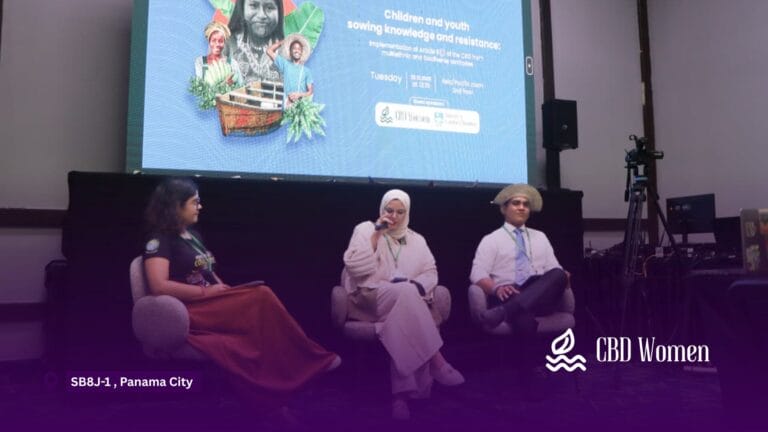By Alice Kammwamba, Indigenous and Local Knowledge (ILK) Coordinator and Project Manager for Malawi’s National Ecosystem Assessment.
From 20th to 23rd January 2025, I had the privilege of representing the CBD Women Caucus at the Southern Africa Expanded Constituency Workshop (ECW) in Johannesburg, South Africa. This event, organised by the Global Environment Facility (GEF), brought together participants from across Southern Africa, including government representatives, civil society organisations, Indigenous peoples, and youth leaders.
The workshop served as a vital platform for dialogue and collaboration, addressing the pressing need for integrated biodiversity action. As a coordinator and advocate for Indigenous and Local Knowledge (ILK) and gender-responsive governance, my role was to ensure that the perspectives of women, Indigenous communities, and local knowledge holders were meaningfully incorporated into the discussions.
Why Gender and Inclusion Matter in Biodiversity Action
Biodiversity solutions must be inclusive and just. Women and Indigenous peoples are often at the forefront of conservation efforts, yet their contributions remain under-recognised in decision-making processes. Through the CBD Women Caucus, we advocate for policies that reflect the lived realities of these communities and uphold their rights.
At the workshop, I joined panel discussions and interactive sessions that explored how gender-responsive approaches and ILK can strengthen biodiversity strategies. Among the points, as CBD Women’s Caucus representative, I brought to the table were:
- Biodiversity Conservation: Highlighting the urgent need to protect ecosystems and species, which is central to both GEF initiatives and the women’s organisations and groups.
- Women’s Rights and Gender Justice: Reinforcing the role of women in conservation and decision-making, advocating for gender-responsive policies in biodiversity governance.
- Indigenous and Local Knowledge (ILK): recognizing the traditional knowledge systems of Indigenous people and local communities in sustainable natural resources management.
These discussions helped shape recommendations for equitable, inclusive, and community-driven environmental policies within GEF-supported projects.
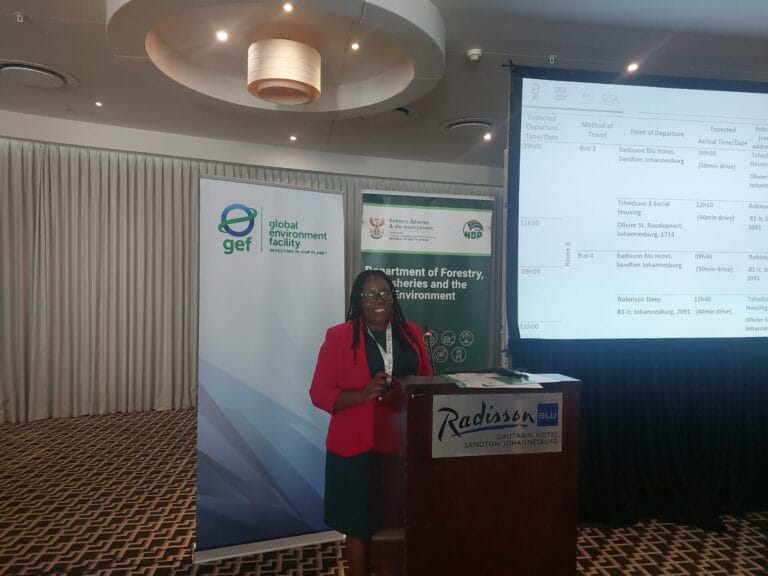
Key lessons from the workshop
The four-day event combined presentations, learning stations, and a hands-on field visit to a sustainable cities project in Johannesburg. Some key takeaways include:
- Integrated Solutions for Complex Challenges: The workshop demonstrated how integrated funding approaches can address biodiversity loss, climate resilience, and sustainable development simultaneously.
- The Role of ILK: Traditional knowledge systems are invaluable in crafting sustainable solutions tailored to local contexts. This aligns closely with the mission of the CBD Women Caucus.
- Gender and Biodiversity Financing: We explored ways to ensure that GEF funding mechanisms empower women and Indigenous peoples, recognising their roles as custodians of natural resources.
The field visit provided a tangible example of what is possible when innovation and inclusivity come together. It reinforced the importance of designing solutions that reflect the needs and strengths of local communities.
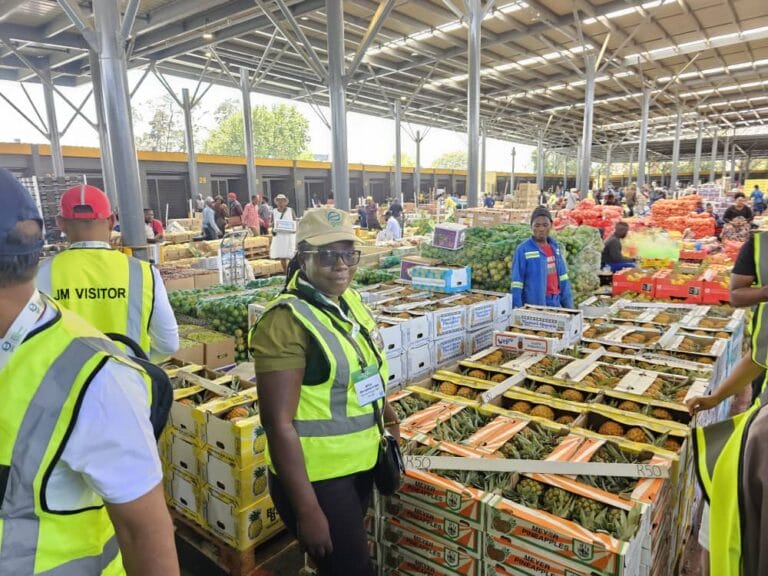
Next steps to move forward!
Moving Forward: Building on Momentum for Inclusive Biodiversity Action
The workshop underscored the critical need for integrated biodiversity strategies aligned with global frameworks such as the Kunming-Montreal Global Biodiversity Framework (KMGBF). It highlighted that inclusive, gender-responsive approaches are essential to achieving sustainable conservation outcomes and empowering the communities most directly involved in protecting ecosystems.
Key next steps call on the GEF Secretariat and national focal points to:
- Ensure Gender-Responsive Programming: Strengthen their engagement with women’s organisations, including the CBD Women Caucus, to ensure that all GEF-funded projects and activities prioritise gender equity and reflect the unique contributions of women and Indigenous Peoples and Local Communities (IPLCs).
- Scale Up Integrated Approaches: Adapt integrated biodiversity solutions to local, national, and regional contexts, ensuring they are inclusive and responsive to diverse community needs.
- Promote Capacity Building and Inclusion: Equip stakeholders with the tools, resources, and knowledge necessary to incorporate gender considerations and ILK into project design and implementation.
- Foster Multi-Sector Collaboration: Strengthen partnerships across governments, civil society, Indigenous groups, and the private sector to ensure inclusive, community-led conservation efforts.
This workshop was a critical step in advancing biodiversity and climate action that is equitable and inclusive. It is essential for the GEF Secretariat and focal points to embed these principles into their strategies and funding mechanisms, ensuring that the voices and priorities of women and IPLCs are at the forefront of conservation efforts. By doing so, we can collectively drive transformational change in biodiversity conservation and climate resilience.
For more information you could visit: https://www.thegef.org/events/southern-africa-expanded-constituency-workshop-2025


